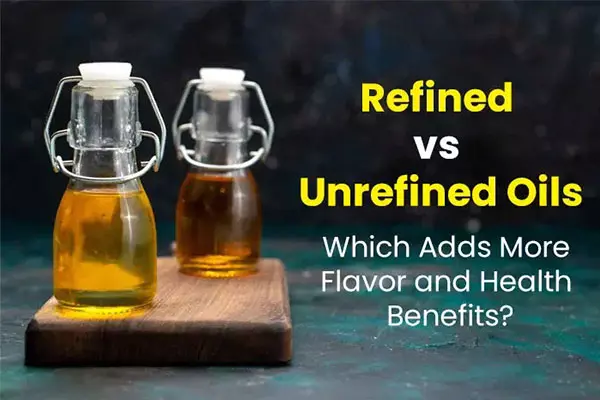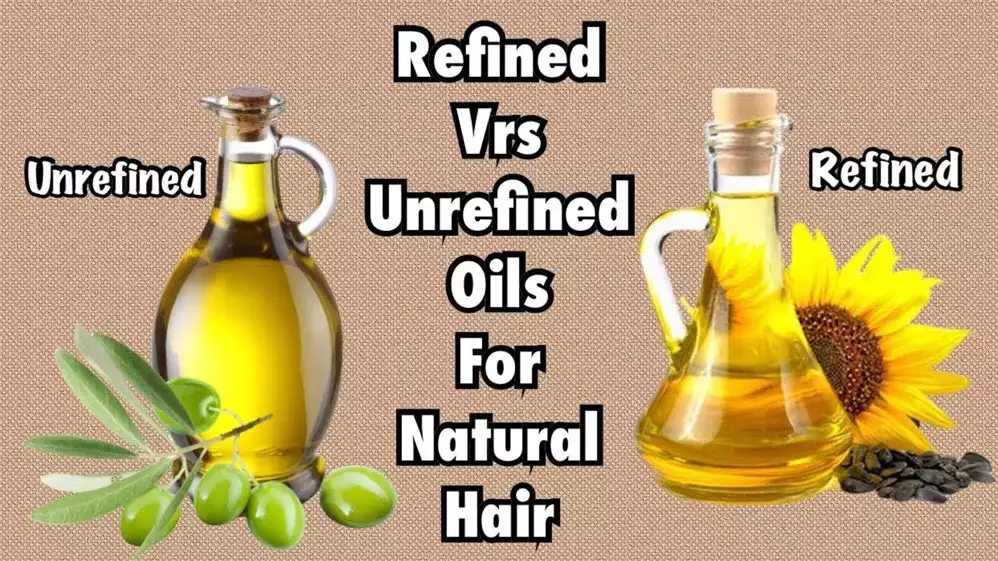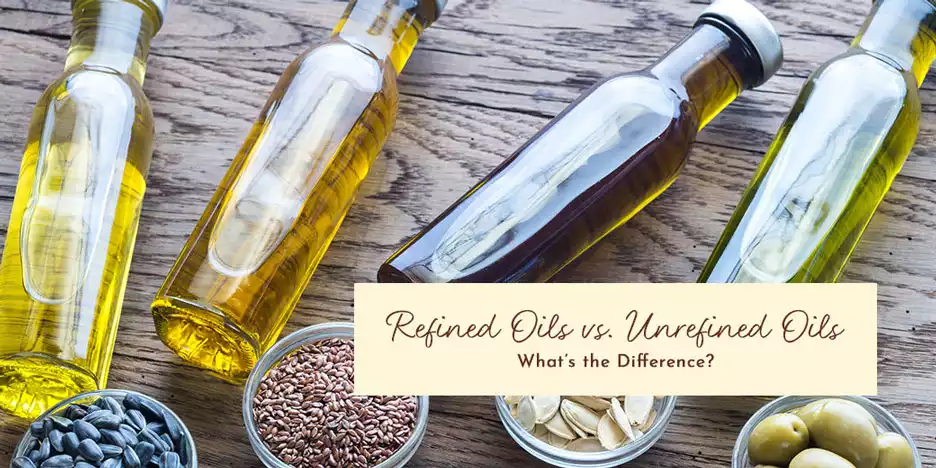
Introduction
In this comparison guide, you’ll learn the difference between refined and unrefined oils, including their different effects on skin, hair, and cooking. You can choose according to different uses.
What is the difference between refined and unrefined oils?
There are differences between refined oil and unrefined oil in terms of processing, physical properties, nutritional value, use scenarios, and safety. The details are as follows:

Refined vs unrefined oil
Processing process
Refined oil: crude oil is obtained through complex processes such as degumming, deacidification, decolorization, deodorization, and dehydration. These processes are to remove impurities, pigments, odorous substances, harmful components, etc. in the oil.
Unrefined oil: Usually obtained by directly pressing plant seeds in the form of cold pressing by mechanical principles. The processing process is relatively simple and retains more natural ingredients and original flavors.
Appearance and color
Refined oil: Due to the bleaching process, the appearance is clearer and brighter, usually transparent or translucent, and the color is uniform.
Unrefined oil: It may contain more impurities and pigments, so the appearance may be turbid, and the color may also vary depending on the plant species and pressing process.
Smell and taste
Refined oil: After deodorization, the odorous substances in the oil and fat are removed. So the smell and taste are purer and suitable for cooking and food processing.
Unrefined oil: retains more of the aroma and taste of the plant itself, and may have a stronger plant flavor. But this aroma and taste may not be accepted by everyone.
Safety
Refined oil: during the processing, removes impurities and toxins harmful to the human body. Improves the safety of oils, making you more assured of using them.
Unrefined oil: may contain residual pesticides, heavy metals, and other pollutants. As well as substances that are harmful to the human body, such as aflatoxin, etc. Its safety is relatively low.
Nutritional ingredients
Refined oil: during the refining process, some nutrients and natural ingredients may be destroyed or lost. Especially some heat-sensitive vitamins and unsaturated fatty acids.
Unrefined oil: retains more natural nutrients, such as vitamin E, polyphenol compounds, etc. They are beneficial to human health.
Application
Refined oil: due to its clear and bright, pure smell, high safety, and other characteristics. It is widely used in cooking, food processing, cosmetics, and other fields.
Unrefined oil: While in some ways less popular than refined oils, unrefined oils are often used in handmade soap making and certain cosmetic formulations due to their unique composition and properties.
Is refined or unrefined oil better for you?
Refined oil is clearer, brighter, has a purer smell, and is safer than unrefined oil. Refined oils are suitable for high-temperature cooking, while unrefined suitable for cold dishes or seasoning. However, unrefined oil has a higher nutritional value than refined oil.
Refined vs unrefined oil for skin
Refined oil is more suitable for sensitive skin or daily skin care needs. Unrefined oil is more attractive to consumers who need specific therapeutic effects or seek natural ingredients.

Refined vs unrefined oil for skin
Refined oil benefits for skin
Mildness and safety: Refined oil has undergone complex processing to remove impurities, odorous substances, and ingredients that may irritate the skin.
Therefore, its texture is milder and suitable for sensitive skin and daily skin care.
Moisturizing and nourishing: Refined oil contains certain antioxidants, such as vitamin E, etc. These ingredients can scavenge free radicals and reduce cell damage.
They also have a certain moisturizing effect, allowing the skin to retain moisture and enhance elasticity. Thereby achieving the purpose of nourishing the skin.
Improve skin health: Although refined oil may have lost some natural ingredients during processing. It still contains substances beneficial to skin health, such as unsaturated fatty acids, etc.
These substances help maintain the normal physiological functions of the skin and improve skin health. state.
Unrefined oil benefits for skin
High content of natural ingredients: Unrefined oil retains more natural ingredients, such as flavonoids, carotene, lecithin, minerals, etc.
Although the content of these ingredients in vegetable oil is not high, they can significantly increase unsaturated fatty acids. It has significant effects in fighting free radicals, preventing chronic diseases, and repairing skin and mucous membranes.
Specific therapeutic effects: Some unrefined oils also have specific therapeutic effects. For example, unrefined tamanu oil has miraculous effects on skin problems such as eczema. These oils can be used as adjunctive treatments in certain situations.
Promotes skin metabolism: The natural ingredients in unrefined oil help promote skin metabolism and accelerate the renewal and repair process of skin cells. Thereby improving the overall health of the skin.
Refined vs unrefined oil for hair
Refined oils are more gentle and safer, and are suitable for daily hair care. Unrefined oils are rich in natural ingredients that can nourish and repair hair. You can make a reasonable choice based on your hair quality, scalp health, and specific needs.
Refined oil benefits for hair
Mildness and safety: Refined oil removes impurities and ingredients that irritate the hair. It is gentler to use and suitable for people of all hair types, especially those with sensitive scalps.
Moisturizing and nourishing: Refined oil antioxidant vitamin E can nourish the hair. Provide the necessary moisture and nutrition for the hair, and help the hair remain soft and smooth.
Long-term use of refined oil for hair care can improve problems such as dry hair and split ends.
Promote scalp health: Certain ingredients in refined oil help promote blood circulation in the scalp. Provide nutrition to the scalp, and thus improve scalp health.
Unrefined oil benefits for hair
High content of natural ingredients: Unrefined oil retains more natural ingredients, such as fatty acids, vitamins, minerals, etc., which have many benefits for hair.
For example, fatty acids can nourish the hair and enhance its toughness and elasticity. Vitamins and minerals help improve scalp health and promote hair growth.
Specific therapeutic effects: Some unrefined oils have specific therapeutic effects, such as emu oil. It has a significant nourishing effect on hair.
The omega fatty acids in emu oil help moisturize and nourish the scalp. Enlarge hair follicles, stimulate hair growth, and make hair thicker and faster.
Deep nourishment and repair: Unrefined oils can penetrate the inner structure of the hair. Strengthen the structure of the hair, repair damaged hair scales. And make the hair healthier and more shiny.
Refined vs unrefined oil for cooking
If need high-temperature cooking, use refined oil such as soybean oil, peanut oil, and sunflower oil. They can reduce the generation of oil smoke and maintain the stability of oil. For low-temperature uses such as cold dishes and salads. You can choose unrefined oils, such as virgin olive oil or sesame oil. They can retain more natural nutrients and unique flavors.

Refined vs unrefined oil for cooking
Smoke point: Unrefined oil usually has a lower smoke point and is suitable for low-temperature cooking. Such as cold dishes or salad dressings. For example, virgin olive oil and sesame oil.
Refined oil has a higher smoke point and is suitable for high-temperature cooking. For example, stir-frying and deep-frying. Refined oils are more stable at high temperatures and are less likely to produce fumes and harmful substances.
Flavor: Unrefined oil usually has a stronger flavor and aroma, which can add a specific taste to food. Refined oil has a more neutral taste and will not affect the original flavor of food.
Conclusion
In conclusion, there are significant differences between refined oil and unrefined oil in terms of processing, appearance, color, smell, safety, nutritional content, and uses. When you make a choice, you should make a reasonable choice based on your needs and preferences.
References:
Get your best price
- Engineer quick quote
- The overall delivery speed is fast
- Financial choice
- Low installation costs and cost savings
30 years+ of oil mill plant R&D
More than 56 innovative technologies
